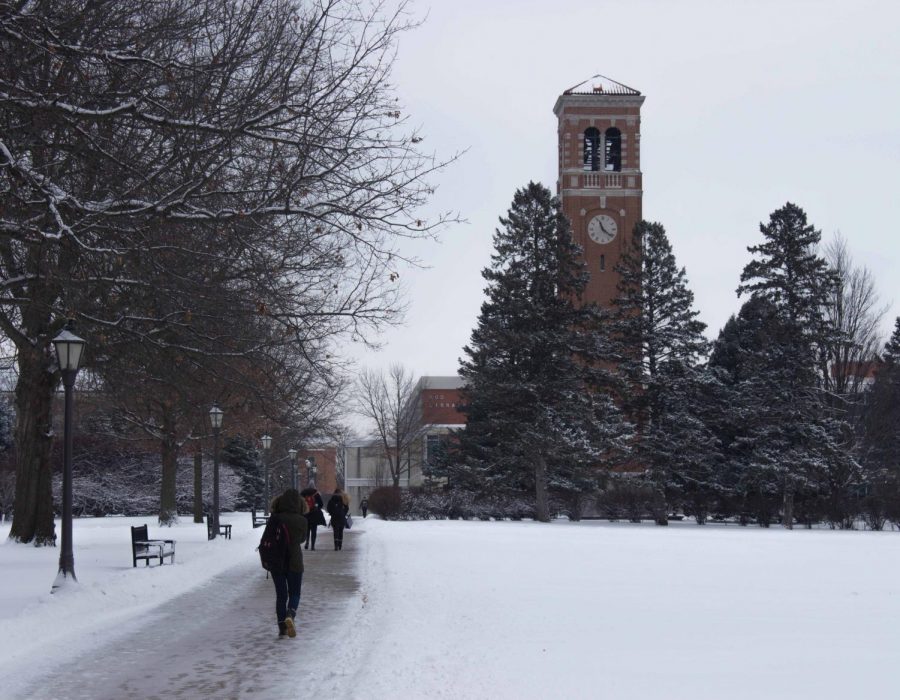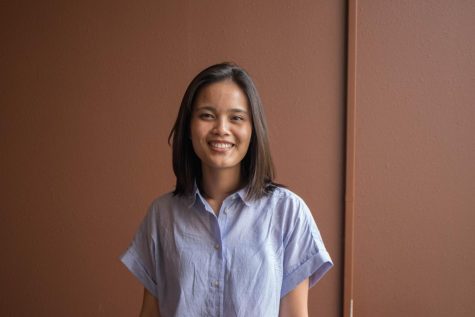LTE: Cancelation policy is classist
Political communication major Hannah Gregor pens a Letter to the Editor discussing the University’s weather cancelation policy and the potential impact it might have on lower-income students and students with disabilities.
Feb 4, 2019
Editor’s Note: This Letter to the Editor was submitted by political communication major Hannah Gregor.
The UNI policy for delays and cancellations states, “It is a basic premise of this policy that University faculty, staff, and students shall have the opportunity to make their own decision about reporting to work or class with due consideration for travel safety conditions.” However, this statement rests on the assumption that students and staff have free choice in regards to their decision and safety.
Many professors have attendance policies for the classroom that do not see transportation issues as an excused absence. In weather such as we have had in the past two weeks, it is very possible for a student to need to miss three classes, resulting in their grade being lowered. Students must negotiate their safety for the sake of passing the class, which in itself is a financial decision. When school is not cancelled or delayed for severe weather, students are coerced into risking their safety to attend class to ensure their grade will not be lowered, even though the ability to show up to class is not a reflection of the knowledge that student has in the course.
Low-income students are more impacted by this policy because winter gear is expensive and when deciding between food and winter clothing, the choice inevitably is food. This is especially problematic when the University’s latest survey on food security found 51 percent of UNI students having varying levels of food insecurity. When the University tells students to “dress warm,” they ignore the high price that layers come at.
Even further, when the University doesn’t have sidewalks plowed and salted on campus throughout the day, they prevent students with disabilities from going to class. If the university wishes to tout their work on diversity, they need to walk the walk and change the policy to help low-income and/or students with disabilities. The administration needs to either change their policy to allow students who miss class due to severe weather be an excused absence, or more regularly cancel classes in severe weather.
Staff on UNI’s campus are also negatively affected by UNI’s cancellation policies. Non-Exempt staff are required to show up to work regardless of the University’s decision to cancel class. If they “choose” not to go to work for safety precautions, they must “elect to use vacation, compensatory time or leave without pay or request to make up the missed time within the same work week (Sunday to Saturday).”
When weather is so unsafe for students or faculty to feel comfortable attending class, are essential employees really so essential they must risk their lives to come to campus? The Rod Library has a policy in which essential staff members must come to work. Are the day-to-day functions of a librarian staff really essential for our campus to continue functioning?
The UNI 4.07 Weather/Working Conditions policy gambles with the lives of people living and working on campus. They argue that we all have a “choice” to make in regards to braving hazardous weather, but once we realize these decisions have financial consequences, we must realize these choices are an illusion meant to serve the purpose of allowing the university to not face the repercussions of putting university staff and students at risk. The Provost says we have a choice, but that ignores the inherent coercion in policy 4.07.










Kathy M Barlean • Feb 8, 2019 at 5:37 pm
At first, because of the politically correct title, I was ready to reject this editorial. However, after reading it, I agree with Hannah Gregor. Allowances need to be made.
Tyler Stoppelmoor • Feb 8, 2019 at 5:25 pm
Hello Sophia. I want to start off by saying I believe that you have a lot of very well spoken points in your argument. I wanted to share a little bit about what UNI and my life after UNI has taught me. One of the things that UNI did a great job for me was prepare me for my post graduate life. As for the non-exempt employees, having to show up, that is more of an expectation that is not unique to UNI.
I currently live in Iowa and also experienced the winter that we had this year, with record setting wind chill. In all of these days, I too was expected to either show up for work, or take a vacation day. Many of my former colleagues, who had their businesses close their offices were also expected to continue working that day from home. That is part of being a non-exempt (or salaried) employee. You are expected to complete your work, what ever it may be, regardless of the number of hours that you put in the week. In reality, the 40 hour work week does not exist for Non-exempt employees.
The second thing my life after UNI has taught me, and something that I experienced at UNI supported is that Policies tend to be flexible. You argue that because the professor sets the attendance policy to have it be so that if you miss/or are late a certain number of times, it impacts your grade. At my time at UNI, I broke my wrist and I needed surgery. After I was released from the hospital I did not feel well enough to make it to an exam. I was out of the hospital long enough that it was no longer considered a medical exception. What I did was I went to the professor and I explained the situation, saying that I was not at 100% and I did not feel prepared, but I was willing to take the exam as it was in their rules that I needed to. Their response was to allow me to take the exam at a later date, they did not ask for anything else. If the professors are setting the polices they are able to make any exceptions they see fit, it is up to the student to talk to them. This is supported by in my professional life. I personally have not been late due to weather, because I plan extra time for my commute, but I have been late because I was rear ended once. All I had to do was explain to my manger the situation, and they told me to take my time.
My final counter point, is that you are claiming that UNI is being classist and discriminating against low-income students and students with disabilities. To your own admission, UNI’s stance is that the professors and the students have the ability to make the best decision for themselves. You also state that the professors then set a different policy. It is incorrect to paint the university as having a poor cancellation policy, if it is the professor’s not following the rules. I would suggest that if you encounter a professor who has an attendance policy that conflicts with the official stance of UNI, to call that professor out on it. At that point, if the University fails to make any corrective actions to that professor, then you can call the University out on not “Walking the Walk”
Angie • Feb 6, 2019 at 9:24 pm
Keep our kids SAFE!!!
Diane Kiley • Feb 6, 2019 at 8:56 pm
Common sense people this is Iowa for heavens sakes
Pat mcnamara • Feb 5, 2019 at 10:19 am
That a girl, woman, advocate, etc. you nailed it. Until you walk in the same shoes, same size, color, width, as the person the policy addresses, make a better policy. Same thing in the work place. I missed many days of work due to snow storms. The city street and roadways might be clear but country roads not for days. My employer gave me very little opportunity to makeup those days. Unpaid days effects the current paycheck but your retirement account.
Thank you Hannah for writing this letter.
Mason Severson • Feb 4, 2019 at 6:58 pm
The Provst is only concerned about his pension and salary, both of which are irrelevant to the safety and staff of the students. Anything that were to happen to students would likely not affect the sycophantic provost, it would only serve to underline how little value is given, honor is shown to physical human life.